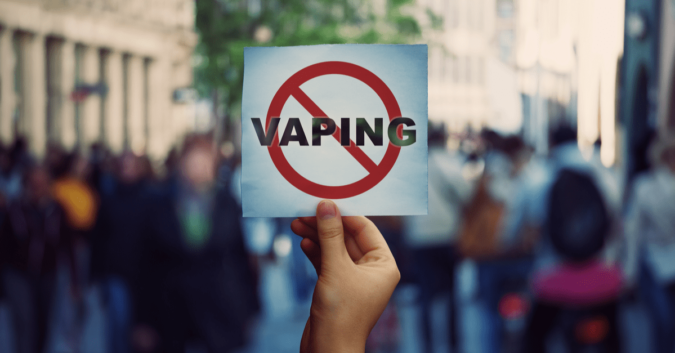Right as the White House backs away from efforts to ban flavored e-cigarettes, some states are forging ahead with measures of their own.
Last week, Massachusetts state lawmakers passed one of the strictest vaping laws in the country. The bill, which awaits the signature of the governor to become law, aims to curb youth vaping in the state, where, according to the Boston Globe, 1 out of every 5 high school students uses e-cigarettes.
MA Proposes Toughest Vaping Bill in the Nation
Already, the bill has been described as one of the toughest in the nation. Aimed at drastically reducing underage tobacco use, it would impose new taxes, prohibitions, and healthcare regulations on nicotine products.
The law would immediately ban all flavored vaping products — such as mint, menthol, and fruit-flavored vape pods — and, starting on June 1, 2020, would outlaw traditional menthol-flavored cigarettes. The law also levies a 75% excise tax on all vaping products and requires in-state health insurers to cover tobacco-cessation programs.
MA State Sen. John Keenan, who sponsored the bill, told reporters Thursday that the bill is designed to fight back against a tobacco industry that knowingly and consistently targets young consumers through deceptive marketing. Keenan said:
“We are telling big tobacco their days of hooking kids in Massachusetts are over. Hopefully, this effort will serve as a roadmap for the rest of the country.”
Bill Supporters Celebrate
Anti-smoking and anti-vaping activists were quick to celebrate the passing of the bill. In a statement to reporters, the American Cancer Society (ACS) Cancer Action Network cited the importance of tackling flavored products as a gateway to addiction:
“80% of teens who have ever used a tobacco product started with a flavored product, and the tobacco industry knows this.”
Matthew Myers, president of the Campaign for Tobacco Free Kids, told reporters that the Massachusetts law, if passed, would be the first state in the nation to completely ban the sale of flavored tobacco products. Myers said in a statement,
“This legislation is a critical step to help end the worsening youth e-cigarette epidemic and stop tobacco companies from using appealing flavors to lure kids into a lifetime of addiction.”
Tobacco Store Owners, Others Upset by Proposed MA Vaping Bill
For its part, the vaping and tobacco industries have expressed disappointment over the bill’s passage. Jonathan Shaer, president of the New England Convenience Store Owners and Energy Marketers Association, told the Associated Press,
“We are disappointed the legislature supports bills that disproportionately impact communities of color and have disastrous implications for public health, public safety, state tax revenue, and jobs in the Commonwealth.”
In September, Massachusetts Governor Charlie Baker declared vaping to be a public health emergency and ordered a temporary ban on the sale of all vaping products. That executive order was immediately met with legal challenges.
In October, a state judge allowed the ban to survive while ordering fixes to account for Baker’s overstepping of executive authority. That ruling was then met with appeals from both the governor and the Vapor Technology Association, a trade group that blamed the temporary ban for millions of dollars in lost retail sales.
Past legal challenges forecast obstacles for the newest ban, which is fully expected to be signed into law by Governor Baker.
The Numbers Don’t Lie: There Is a Teenage Vaping Epidemic
The boldness of Massachusetts regulators contrasts with the hesitation of the federal government to tackle the issue of underage vaping.
Two months ago, President Trump announced plans for a nationwide ban on flavored vaping products. That announcement was largely in response to concerns about skyrocketing nicotine use among teens, mostly thanks to vaping.
According to the Centers for Disease Control and Prevention (CDC), the use of e-cigarettes among U.S. high schoolers soared from just 1.5% in 2011 to 20.8% in 2018. That’s an increase of nearly 3 million teenagers, and experts believe flavored products are to blame for the uptick.
A recent study by the Food and Drug Administration (FDA) found more than 96% of teens surveyed started vaping with flavored e-cigarettes.
But despite promising in September to protect kids from the allure of flavored tobacco products, President Trump now appears to be retreating from that promise. Earlier this month, after hearing from aids who warned him that such a rule may not play well with his voter base, Trump canceled the signing of an order that would ban the sale of flavored products in the country.
Last week, he expressed more uncertainty after hearing from a number of vaping lobbyists and health officials, each arguing for and against proposed bans, including the prospect of increasing the legal purchase age of electronic cigarettes from 18 to 21.
Following the meeting, Trump seemed unconvinced of a ban, telling reporters, “If you don’t give it to them, it’s going to come here illegally."
